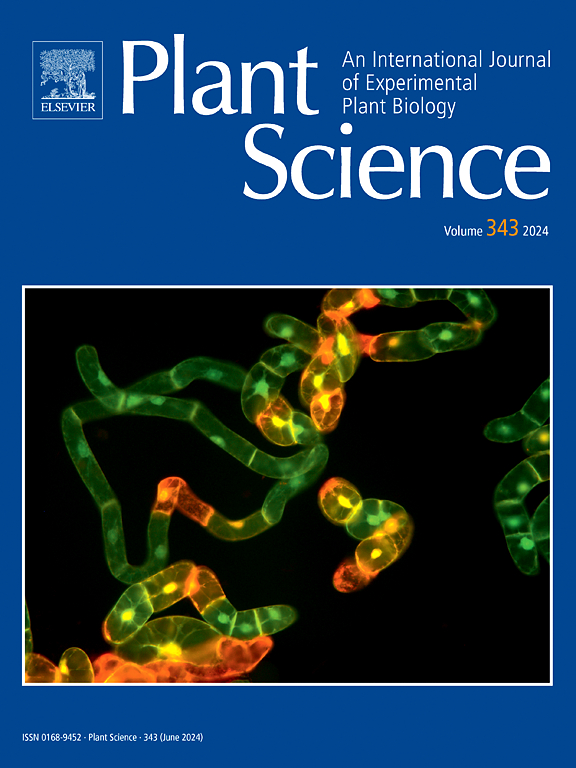Comparative effects of ZnSO4 and ZnO-NPs in improving cotton growth and yield under drought stress at early reproductive stage
IF 4.2
2区 生物学
Q2 BIOCHEMISTRY & MOLECULAR BIOLOGY
引用次数: 0
Abstract
Drought episodes, especially during the reproductive stages, have posed a significant threat to cotton production on a global scale. Finding an efficient solution that would bring immediate advantages to cotton producers has received unprecedented interest from the research community. Mineral supplements can play an important role in combating drought, while also improving fiber yield and cotton quality. The current study evaluated the comparative effectiveness of zinc sulphate (ZnSO4·7 H2O; 1.0 g Kg−1 potting mix) and zinc oxide-nanoparticle (ZnO-NP; 0.1 g Kg−1 potting mix) supplements in improving cotton drought tolerance and yield attributes. Supplementation of zinc (Zn) to potting mix, particularly in the form of ZnO-NPs, increased cotton growth, root and shoot biomass, and hydration status during drought. Both Zn supplements boosted the enzymatic antioxidant system and contributed to membrane integrity by minimizing drought-induced oxidative damage. Gene expression analysis using RT-qPCR also showed high corroboration with the antioxidant activity assay data. ZnO-NP-supplemented plants showed better performance in mineral uptake and accumulation than ZnSO4-supplemented plants under both well-watered and drought conditions. In terms of yield, ZnO-NP-supplemented plants outperformed ZnSO4-supplemented plants in both drought and well-watered circumstances. The correlation network analysis also provides evidence of Zn-mediated coordination of antioxidant defense system and yield performance. Altogether, the findings of the present study suggest that ZnO-NPs have better potential than ZnSO4 in mitigating the harmful effects of drought on cotton to enhance its performance under soil conditions with restricted water availability.
ZnSO4和ZnO-NPs对生殖早期干旱胁迫下棉花生长和产量的比较效应
干旱,特别是在繁殖阶段,对全球范围内的棉花生产构成重大威胁。寻找一种能给棉花生产者带来直接好处的有效解决方案已经引起了研究界前所未有的兴趣。补充矿物质可以在抗旱方面发挥重要作用,同时还可以提高纤维产量和棉花质量。本研究评估了硫酸锌(ZnSO4·7H2O;1.0g Kg-1盆栽混合料)和氧化锌纳米颗粒(ZnO-NP;添加0.1g Kg-1盆栽混合液提高棉花耐旱性和产量属性。在盆栽混合料中添加锌(Zn),特别是以ZnO-NPs的形式添加锌(Zn),可以提高棉花的生长、根和梢生物量,改善干旱期间的水化状态。两种锌补充剂都促进了酶抗氧化系统,并通过减少干旱引起的氧化损伤来促进膜的完整性。RT-qPCR基因表达分析结果与抗氧化活性实验数据高度吻合。在丰水和干旱条件下,zno - np补氮植株对矿物质的吸收和积累均优于znso4补氮植株。在干旱和丰水条件下,zno - np补充植株的产量均优于znso4补充植株。相关网络分析也提供了锌介导的抗氧化防御系统与产量性能协调的证据。综上所述,在水分有效度受限的土壤条件下,ZnO-NPs比ZnSO4更有潜力缓解干旱对棉花的有害影响,提高棉花的生产性能。
本文章由计算机程序翻译,如有差异,请以英文原文为准。
求助全文
约1分钟内获得全文
求助全文
来源期刊

Plant Science
生物-生化与分子生物学
CiteScore
9.10
自引率
1.90%
发文量
322
审稿时长
33 days
期刊介绍:
Plant Science will publish in the minimum of time, research manuscripts as well as commissioned reviews and commentaries recommended by its referees in all areas of experimental plant biology with emphasis in the broad areas of genomics, proteomics, biochemistry (including enzymology), physiology, cell biology, development, genetics, functional plant breeding, systems biology and the interaction of plants with the environment.
Manuscripts for full consideration should be written concisely and essentially as a final report. The main criterion for publication is that the manuscript must contain original and significant insights that lead to a better understanding of fundamental plant biology. Papers centering on plant cell culture should be of interest to a wide audience and methods employed result in a substantial improvement over existing established techniques and approaches. Methods papers are welcome only when the technique(s) described is novel or provides a major advancement of established protocols.
 求助内容:
求助内容: 应助结果提醒方式:
应助结果提醒方式:


